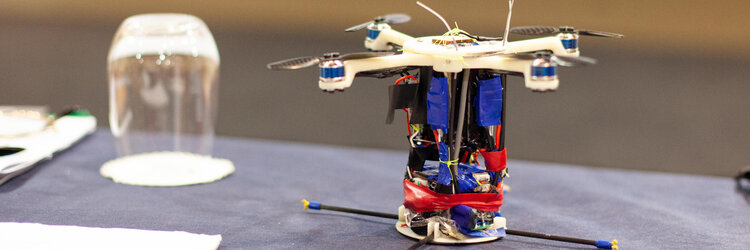The Winners of the 2019 European CanSat Competition are...
Between 24th and 28th of June, student teams from 18 different ESA Member States and Canada competed in the 9th edition of the European CanSat Competition. Two guests teams from Malta and Japan also took part, making a record-breaking total of 20 teams!
All teams qualified for their place in the final launch campaign on merit, either from winning their national competition or recognition directly from ESA. This year, the launch campaign was hosted in Bologna, Italy by Sierrafox Srl in collaboration with local partners, on behalf of ESA.
During the campaign, the teams were judged not only on the technical performance of their CanSat, but also the scientific value, the extent of their educational outreach, and their professional skills including teamwork and communication.
ESA is delighted to announce that the winners are…

Best CanSat Project: PerpetuumMobile from Elisabeth-Gymnasium Halle, Germany. The team’s CanSat performed a stabilised, autonomous landing and transformed into a quadrocopter for additional data collection, acting as an exploratory space probe.

Highest Technical Achievement: IturramaSat 2019from IES Iturrama, Spain. They successfully trained a neural network to interpret data, collected via radar from their CanSat during launch that operated with bidirectional communication, as a method of reliably determining the altitude in unknown atmospheres.

Outstanding Science Mission: ArctowSky from Zespół Szkół Społecznych STO im. Pawła Jasienicy, Poland. Despite not retrieving their CanSat after launch, they used previous datasets and were able to map and classify terrain using a neural network; a tool that could be applied for mapping areas affected by natural disasters, in real time.

Most Professional Team: Catmosphere from Bergen Katedralskole, Norway. The team faced very difficult circumstances when their CanSat was lost with their luggage at the airport! Nevertheless, they rebuilt a functioning CanSat with strong teamwork skills and a high level of dedication, resilience and professionalism. They still successfully completed the Primary mission and collected air temperature and pressure data.

Best Outreach: Charles 4th from SPŠE a VOŠ Pardubice, Czech Republic. In addition to taking atmospheric measurements, the team displayed their CanSat’s data in virtual reality so the audience could use a VR headset and feel like they were on board the space probe!

Honorary Prize: Project Beta from Stanislascollege Pijnacker, The Netherlands. The team went above and beyond in their efforts to help other teams recover their CanSats, meanwhile successfully achieving their mission, considered by the jury to be a good starting point for a real space mission: to safely deploy two smaller satellites (BabyCans) from the main CanSat (MotherCan) to collect data from a larger sample area.
Congratulations to the winners and all participating student teams!
Launch Campaign Highlights
Day 1: The launch campaign began with the opening ceremony on the first night, followed by dinner with the chance for all the teams to get to know each other.
Day 2: The hard work started on the second day, when teams completed rigorous technical inspections and drop tests by drone in order to certify their CanSats as flight-ready. In addition, the morning was dedicated for short introductory presentations to the jury, following by interactions with the jury in the working space in the afternoon.
Day 3: The following day was launch day! Each team was assigned a launch window and prepared their ground station for collecting data, near the launch site. Ten rockets, each holding 2 CanSats, were successfully launched up to an altitude of 1km and you can watch the live-streaming of the launches! The extreme heat (37 degrees Celsius!) didn’t help teams in their search for CanSats, but despite all difficulties 14 CanSats out of 20 were found!

Day 4: The final presentation day gave the student teams the opportunity to present their conclusions drawn from the data they collected. After twenty impressive presentations, the jury deliberated and were able to crown the winners for each category of the 2019 European CanSat Competition! In the evening, the teams could celebrate by socialising and relaxing in the local town.
Day 5: On the last day, the teams were treated to a well-earned break as they were given the opportunity to visit a waterpark in Bologna. They had a lot of fun exploring all 22 pools and water slides! In the afternoon, final farewells were made and contacts exchanged for new friendships, before beginning the long journeys back to their home countries.
Special thanks
ESA would like to thank the distinguished members of the jury of space and education experts: Mr Antonio de Luca, Ms Inna Uwarowa, Mr Matthew Rowlings and Ms Annalisa Terracina, for their invaluable contribution to the competition and for the precious advice they gave the student teams throughout the final launch campaign.
Thanks also go to Sierrafox Srl, ACME Italian Rocketry Association and their partners, for their hospitality and the efforts in making CanSat 2019 an unforgettable event.
Finally, thanks to all of the student teams, teachers and national competition organisers for their enthusiasm, great commitment and outstanding results. Thanks for inspiring us!!















 Germany
Germany
 Austria
Austria
 Belgium
Belgium
 Denmark
Denmark
 Spain
Spain
 Estonia
Estonia
 Finland
Finland
 France
France
 Greece
Greece
 Hungary
Hungary
 Ireland
Ireland
 Italy
Italy
 Luxembourg
Luxembourg
 Norway
Norway
 The Netherlands
The Netherlands
 Poland
Poland
 Portugal
Portugal
 Czechia
Czechia
 Romania
Romania
 United Kingdom
United Kingdom
 Slovenia
Slovenia
 Sweden
Sweden
 Switzerland
Switzerland































